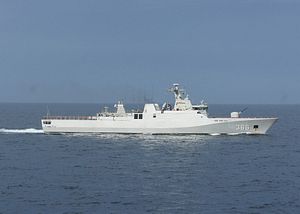Earlier this week, the Indonesian defense minister said that the country would boost its defenses near the South China Sea in anticipation of future threats.
Defense Minister Ryamizard Ryacudu said that Indonesia will equip the Natuna islands near the South China Sea with a port and extend its military air base runway so that it can accommodate more planes. He also added that more jet fighters would be stationed at the Ranai military air base in Natuna.
“We are not in a war situation, but the South China Sea is very close to us,” Ryamizard added. “We have to be prepared. Our weapon systems are good, but we need to add more so that we don’t need to worry all the time.”
To close observers, Ryamizard’s comments are consistent with Indonesia’s general approach to South China Sea disputes. As I have written before, while Indonesia is not a claimant, Jakarta has long been concerned that a portion of the surrounding waters of its resource-rich Natuna islands overlaps with China’s expansive nine-dash line claim (See: “Natuna is Indonesian, Not Chinese: Jokowi Adviser”).
In response, since the 1990s Indonesia has been using a mix of diplomatic, legal, and security measures to fashion a delicate approach to oppose China’s claims without officially recognizing (and thus legitimizing) them (See: “No, Indonesia’s South China Sea Approach Has Not Changed”). Within this approach, the South China Sea – and the Natunas, in particular – have been a central feature in Indonesian defense thinking. For instance, the Natunas have been included as one of the main flashpoints to watch since the 2000s as the Indonesian military (TNI) works towards achieving a Minimum Essential Force by 2024 (See: “Between Aspiration and Reality: Indonesian Foreign Policy After the 2014 Elections”).
Even before President Joko “Jokowi” Widodo took power, China’s growing assertiveness – which has included encroachments into Indonesian waters and instances of direct confrontation – has prompted Indonesian military officials to be more outspoken about the South China Sea issue and led to several announced shifts in capabilities including in the Natuna Islands. In February 2014, during a visit to China, then TNI chief General Moeldoko announced that Indonesia would station additional forces around the Natuna waters to “anticipate any instability.” In March, Indonesian Army Chief of Staff General Budiman announced that Indonesia would upgrade its airbase facilities with the long-term goal of permanently deploying a squadron of Sukhoi fighter aircraft and four Boeing AH-64E Apache attack helicopters on the Natuna Islands.
Under Jokowi, Indonesia has continued to focus on the Natunas as part of its foreign policy priorities of preserving Indonesia’s sovereignty and strengthening its maritime capabilities (See: “The Trouble With Indonesia’s Foreign Policy Priorities Under Jokowi”). To take just one example, earlier this year, the Natunas were selected as one of several potential locations for a new military base – although, as I indicated then, that development stemmed from a broader concern about threats to border areas which come not only from China, but some of Jakarta’s other neighbors too (See: “A New Indonesia Military Base Near the South China Sea?”). Just last week, Indonesia’s Navy Chief of Staff Adm. Ade Supandi said that Indonesia needed to maintain security and stability in the South China Sea in the face of rising threats.
“[We should] maintain security and stability in the South China Sea, especially with the recently increasing intensity of threats,” Supandi said.
Ryamizard’s comments suggest that these upgrades are likely to proceed as planned under Jokowi’s tenure and that Jakarta continues to see the South China Sea as one of the key security challenges it needs to be concerned about.































